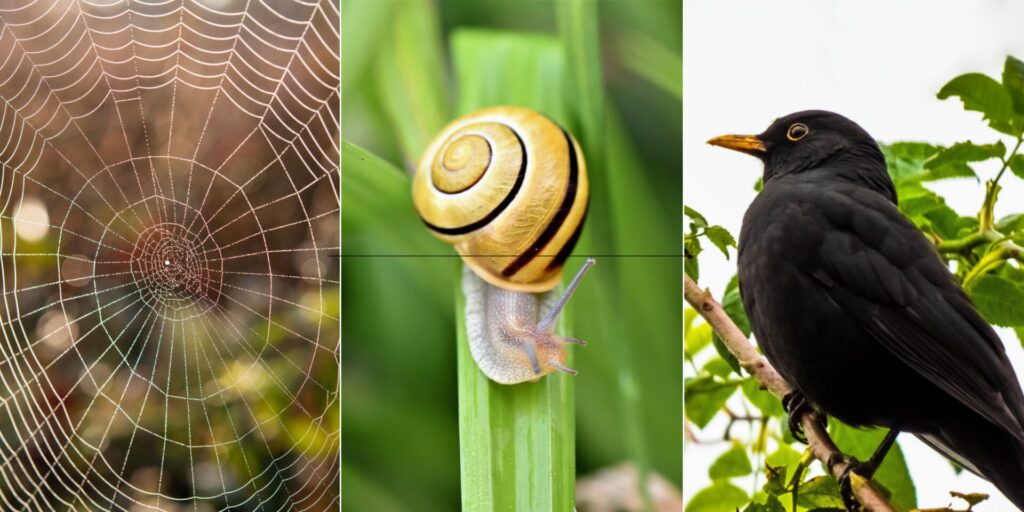
Hello, its Jenny from Frome Wild Bunch.
Can I ask you a question? I wonder how much bird activity there is in your garden, park, neighbourhood? Do we do everything we can to encourage them into our gardens and wild spaces? All the creatures we share our gardens with, including slugs, rats, mice, ants, worms, aphids and caterpillars – all these so-called ‘pests’ that gardeners have spent far too much time and trouble trying to eliminate – are part of the rich, interwoven web of life. Are we sharing our spaces with them, or are we still trying to eliminate them?
I think by watching the birds and insects etc in our gardens and wild spaces, we can learn so much. If we spend a little time observing the natural world in our gardens, parks and window boxes, we quickly learn that there are no good guys and bad guys. A spider catches a fly, a bird catches the spider, the birds’ nest gets raided by other predators. They are all part of the same story. A daily part of life, a rich interwoven web that carries on every day. Let’s work with it and try not to destroy this amazing, interlocking web of life.
The Wildlife Trusts, along with the Royal Horticultural Society (RHS) are encouraging us to rethink our relationship with slugs and snails, and ‘Make friends with molluscs’. These creatures have a positive role in our ecosystems. They feed on dead matter, rotting plants, fungi and dead animals, helping to recycle nutrients back into the earth. They are in themselves food for many other creatures. There are around 150 UK species of slugs and snails and only a few can cause problems with our crops. If we try to kill them with chemicals these chemicals transfer to the food chain and kill other animals like hedgehogs, who predate on slugs. The advice is to pick them off your tender crops and put them somewhere else.
I do everything I can in my little patch to encourage all life. I enjoy seeing the birds display to attract mates, hearing the blackbirds’ beautiful song and seeing the intricate webs of spiders in the morning dew. I really would miss the birdsong if it should disappear, but sadly lots of birds are disappearing from our skies. A wren’s nest is a beauty to behold, so intricate, have you ever seen one? They, like us, need somewhere safe to raise their young. Sadly, so much habitat has already gone. If we can resist chopping and cutting hedges and let them grow undisturbed in the nesting period, this would help protect many birds from predators. In fact, it was illegal where I used to live in Wales, to cut your hedge in the bird-nesting season. Predators on our declining bird species have been introduced by us including our well-fed cats and ever-growing population of grey squirrels. Can we manage this better to help the wildlife more?
Honeybees are searching for nectar-rich flowers, spiders’ webs are easily destroyed: we have been interfering with this interwoven web to such an extent that wildlife is really struggling to find a place that’s safe, and food to sustain them. It does not have to be like this.
In the last few years, awareness of the importance of the natural world on human health and wellbeing has grown enormously. The small but significant changes that we can make as gardeners, growers, interested people – like having a small pond, leaving grass to grow long, not over cutting hedges and growing plants for pollinators – should be mainstream.
In our modest backyard, we can help preserve and treasure our natural world, this will make our planet a better place – not just for ourselves but for every living creature.
Find out more about the Make friends with molluscs’ campaign at www.wildaboutgardens.org.uk.
Frome Wild Bunch meet once a month, we are open to others to come and join us to encourage wild life friendly gardening in Frome. Information about the next meeting on Thursday 18th April is at https://bit.ly/fromewildbunch-apr24

